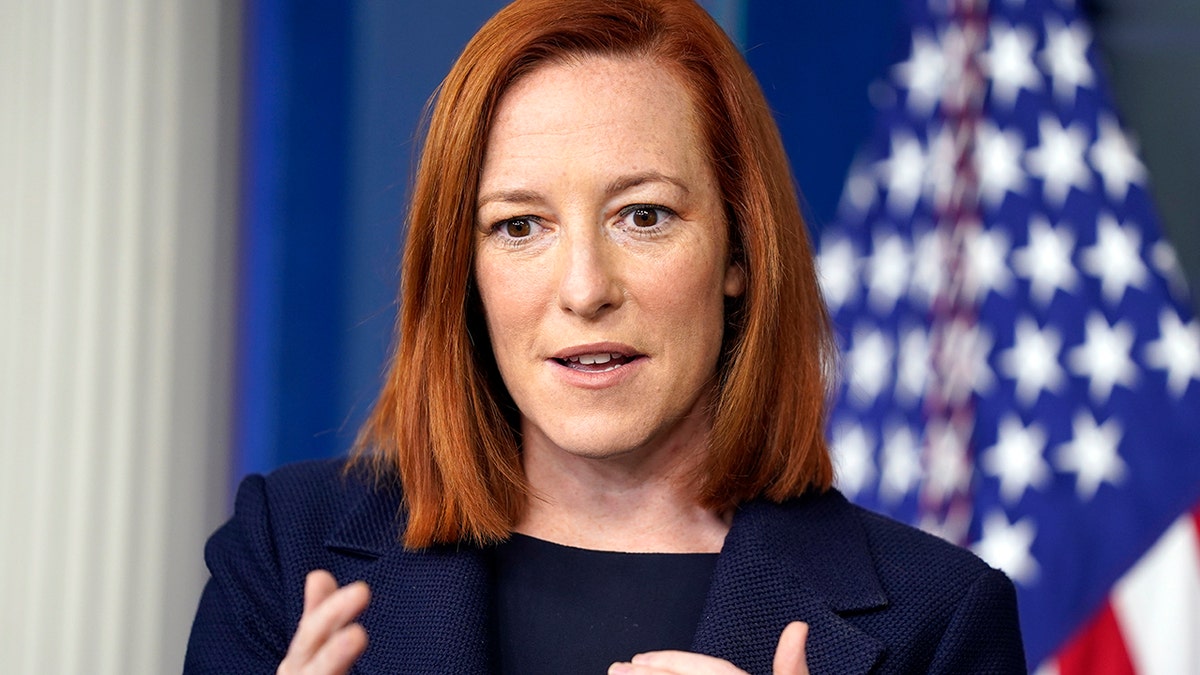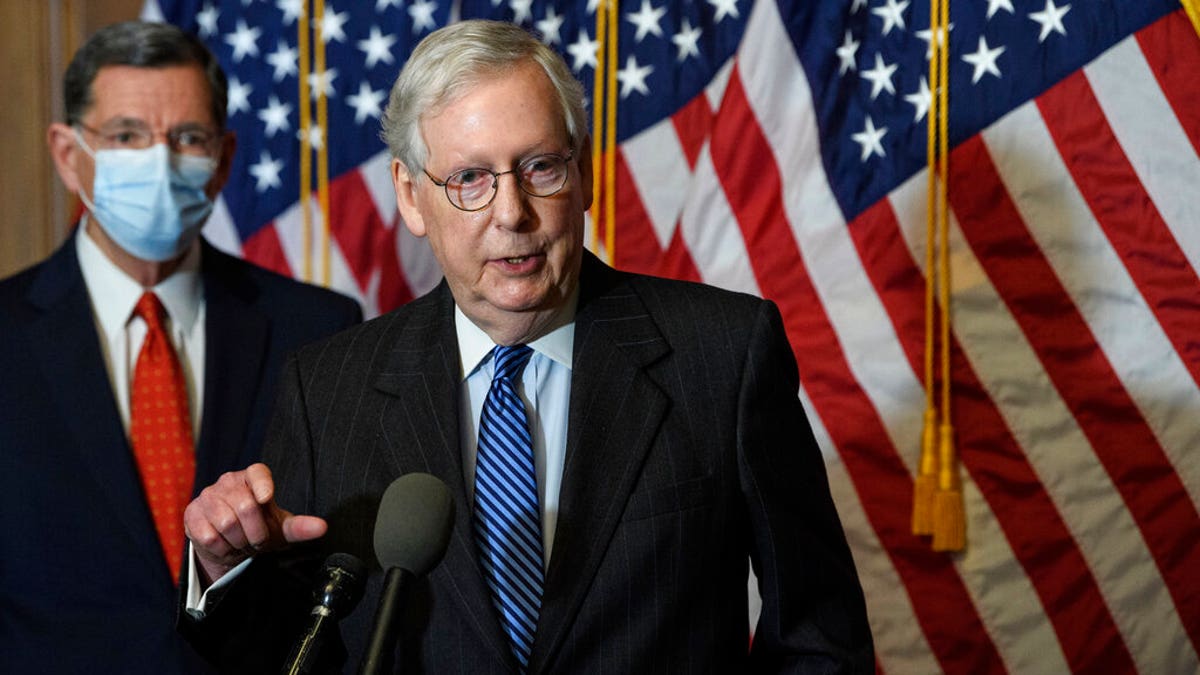Fox News Flash top headlines for March 31
Fox News Flash top headlines are here. Check out what's clicking on Foxnews.com.
White House press secretary Jen Psaki said on Wednesday morning that President Biden is open to dividing Democrats' controversial election bill into multiple parts after Sen. Joe Manchin last week said he didn't think Congress should pass the entire thing at once.
Psaki's comments come after the Senate held a heated hearing on the legislation, S.1 in the Senate and H.R. 1 in the House, last week which saw Senate Minority Leader Mitch McConnell, R-Ky., and Majority Leader Chuck Schumer, D-N.Y., trading accusations of "shame."
After the hearing, Manchin, D-W.Va., released a statement saying that he supports some of the bill but that Congress would risk decreasing Americans' trust in elections by passing H.R. 1 or S.1 along party lines. Manchin is the only Democrat in the Senate that is not a co-sponsor of S.1.
"America's declining trust in the government and each other makes it harder to solve key problems," Manchin said. "That trust will continue to diminish unless we, as members of Congress, transcend partisanship to strengthen our democracy by protecting voting rights, implementing commonsense election security reforms, and making our campaign finance system more transparent."

White House press secretary Jen Psaki speaks during a briefing at the White House, Monday, March 29, 2021, in Washington. (AP Photo/Evan Vucci) ((AP Photo/Evan Vucci))
"Pushing through legislation of this magnitude on a partisan basis may garner short-term benefits, but will inevitably only exacerbate the distrust that millions of Americans harbor against the U.S. government," he added.
The moderate senator who has seen his power skyrocket with the Senate split 50-50 said he supports expanded early voting, help for Native Americans, limiting dark money in politics and more. But his opposition to doing all that and much, much more in one fell swoop essentially killed any chance Democrats had of getting S.1 through the Senate intact.
"We know that there's going to be a process ... it's going to work its way through Congress," Psaki said on MSNBC's "Morning Joe" Wednesday, in response to Manchin and reports other Democrats were backing away from the bill too. "We always expected that there would be some changes to the House bill as it worked its way through the Senate, because as you all know, there's differences of opinion."
Psaki added: "Whether it's multiple bills, one big bill, we'll let the Senate work that through. Our focus is really ensuring that there is a bill passed on the president's desk that will make voting easier, more accessible, and we're confident that there's a way to do that."

Sen. Joe Manchin, D-W.Va., adjusts his face mask as he arrives for votes on Biden administration nominees, at the Capitol in Washington, Tuesday, March 16, 2021. (AP Photo/J. Scott Applewhite)
MCCONNELL SAYS DEMS TRYING TO USE POWER TO HELP 'WIN ELECTIONS IN PERPETUITY' WITH HR1, DC STATEHOOD
One option Psaki said she would be open to is passing a separate voting bill named for the late Rep. John Lewis, D-Ga., before S.1.
"The Georgia law brings again to light the need to get reforms in place that people can come together around," Psaki said, referring to a recently passed law in Georgia aimed at boosting election security. "We are very open to whatever order the Senate, leaders in the Senate, Leader Schumer and others think it appropriate here. We would like to see both pieces of legislation pass."
S.1 and its companion legislation, H.R.1, which passed the House with only Democratic votes, would ban states from requiring photo ID to vote; raise barriers for states to clear voter rolls; require states to offer drop boxes for 45 days before an election and much more.
It would also change the makeup of the Federal Election Commission (FEC) from six total members with three from each party to a body with two members from each party and a third unaffiliated with either party but appointed by the president. Republicans say that this provision, along with many others in the bill, makes the bill more of a partisan power grab than a civil rights bill, as Democrats frame it.
"Talk about shame. If anybody ought to be feeling any shame around here, it's turning the FEC into a partisan prosecutor, the majority controlled by the president's party, to harass and intimidate the other side," McConnell said at last week's hearing. "That's what you ought to be ashamed about."

Senate Majority Leader Mitch McConnell of Ky., speaks during a news conference with other Senate Republicans on Capitol Hill in Washington, Tuesday, Dec. 15, 2020. Sen. John Barrasso, R-Wyo., listens at left. (Nicholas Kamm/Pool via AP)
He also warned the bill is "an invitation to chaos" that state officials would not be able to implement before the 2022 midterms, with mandates on everything from how they can run early voting to the type of adhesive allowed for ballot envelopes.
Schumer, meanwhile, said GOP opposition to the bill was the equivalent to opposition to equality.
CLICK HERE TO GET THE FOX NEWS APP
"Our move to equality, our move to fairness has been inexorable. But it didn't happen on its own, it took mighty movements and decades of fraught" political fights, Schumer said. "I would like to ask my Republican colleagues, why are you so afraid of democracy?"
Unless Manchin and Sen. Kyrsten Sinema, R-Ariz., change their minds about their support for the filibuster -- the 60-vote threshold for most bills to get to a final vote in the Senate -- any election reform will almost certainly have to be a bipartisan compromise.
It's not clear when or if such efforts will come to fruition, as Congress is also inundated with other efforts including confirming Biden's Cabinet and judicial nominees, passing his infrastructure plan and much more.















































